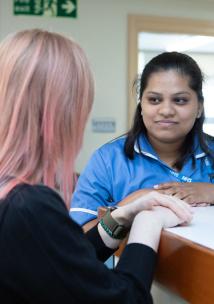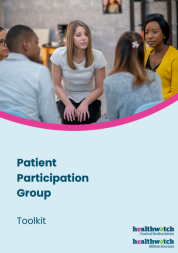Great Big MK GP survey: report and recommendations

“I have had to continue living in pain and anxiety."
The demand for GP appointments and the difficulty we're experiencing getting the help we need doesn’t always feel like it has improved.
But, in the background, the people who design and deliver primary care services have been working hard to improve access. There is a lot happening: employing more people in GP practices with different specialties, increasing the number of things that pharmacies can help with, improving telephone systems to beat that long hold queue, and increasing the use of digital triage systems to ensure that all of us get the right care, by the right person, at the right time.
Some of these changes are welcomed, and we know that some have caused some residents difficulties. Because many of these changes have been nationally mandated, we wanted to know if they were working, for our residents, the way that NHS England hoped they would.
Our recommendations to the BLMK Integrated Care Board and to all GP practices in Milton Keynes
Improving access and flexibility
- Tackle the 8am rush: GP practices should think about spreading out the release of appointment slots throughout the day to avoid the usual 8am scramble.
- Make online booking easier: online booking systems need to be reliable and always available when patients need them.
- Ensure accessibility for everyone: GP practices should make sure all booking options meet accessibility standards, so everyone, regardless of their needs, can easily book an appointment.
- Clear communication is key: GP practices should clearly explain the roles and training given to care navigators. This will help patients to better understand how a care navigator’s questions help them make the appointment that is most appropriate for the patient’s need. It's also important to be clear that people should be referred to Urgent Care because their need is urgent - not because there are no appointments available at the practice.
2. Making future appointments easier
- Offer more flexible scheduling: GP practices should make sure there are a good mix of appointments available for both advance booking and same-day needs, especially for follow-ups or routine checks.
- Keep online booking systems open: It’s crucial that online booking systems work smoothly for a variety of advance appointments. If there are any issues, patients should be informed right away.
- Simplify cancellations: GP practices should introduce easy ways to cancel appointments, like a dedicated phone line or a quick online form, so that slots can be freed up for others.
3. Improving triage and use of other health professionals
- Better triage training: receptionists and care navigators should receive thorough training in triage so they can guide patients to the right care more effectively.
- Explain non-GP roles clearly: patients should be informed about the qualifications and roles of non-GP professionals, like Physician Associates and Nurse Practitioners, so they feel confident in the care they receive.
Enhancing care, support, and patient wellbeing
- Patient check in after appointments: GP practices should set up a 'follow up' system for patients who need ongoing care after their visits, especially those with ongoing health issues. For example, patients with new medications, a new diagnosis, or those who have just come home from hospital.
- Boost communication skills: all healthcare providers should receive communications or ‘customer service’ training to ensure they are listening to and understanding their patients’ concerns during appointments.
Addressing accessibility needs
- Regular accessibility checks: GP practices should regularly review how well they’re meeting patients’ accessibility needs, including physical access and interpreters, communication aids, and easy-read materials.
- Raise staff awareness: ongoing training is essential for all staff to better understand and address various accessibility needs, whether related to mobility, neurodiversity, or language.
Ensuring annual and routine health checks happen
- Keep up with health check invitations: GP practices should regularly check their systems to make sure all eligible patients, especially those with certain health conditions, are invited for their annual physical health checks.
- Educate patients: it’s important to inform patients about the significance of these health checks and what they involve so they understand and participate.
Managing and communicating waiting lists
- Speed up referrals: GP practices should work closely with hospitals and other secondary care providers to shorten the time it takes to get patients onto appropriate waiting lists.
- Provide support whilst waiting: for those on long waiting lists, offering interim care or regular check-ins to help manage their health and reduce the need for emergency care would improve the patient experience.
- Be transparent about wait times: patients should be kept in the loop about where they stand on waiting lists and given realistic expectations for when they might get an appointment or procedure.

